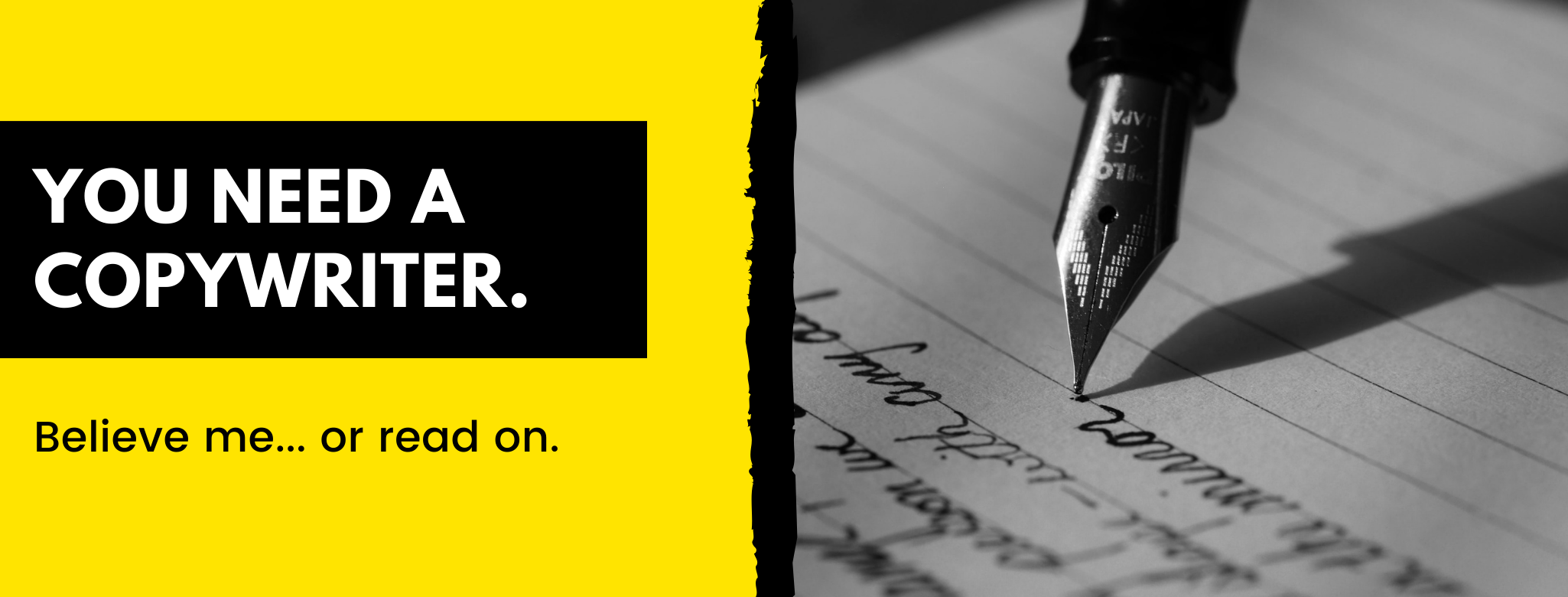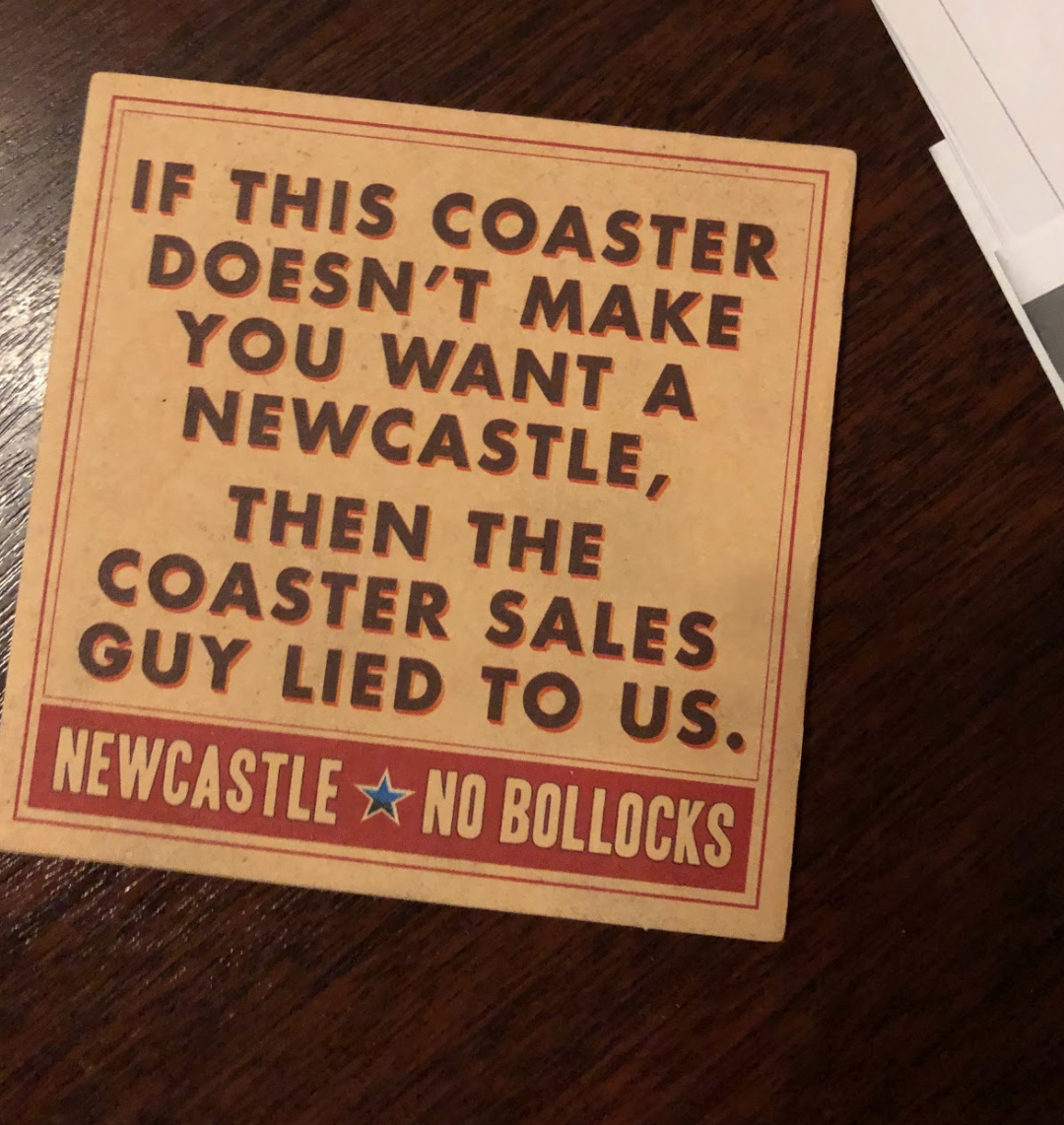5 persuasive reasons why every small business should hire a copywriter—and where to find one.
A good copywriter is the one-person marketing department your small business so desperately needs. Even if you don’t know you do.

“No, you see Pat, I’ve learned to write in preschool. So did my staff. I don’t need a scribbler.”
That’s what you might think. But have you seen this British wine ad written by someone who, probably, learned to write in preschool as well?
Doesn’t that make you cringe? If it didn’t, “obvs,” I’ll tell you why it should—and how a copywriter could improve it.
But first, let’s play a game of guess the service. What do you think this company does?
Fuck if I know. Something with online shops. Did you even read the whole thing? No one likes to listen to their just-got-my-bachelors-in-marketing cousin, spitting buzzwords. Yet, this is how that text reads.
Before I show you how we can improve it, I’ll tell you what a copywriter is.
Because every time I tell someone I’m a copywriter, they look at me as if I just made that word up.
What is a copywriter?
“Oh, you’re the guy that writes the copyright page!”
“No, I write the copy.”
“You just copy stuff?”
It’s confusing. Most people know copy as a duplicate of a document. But it has a second meaning. Coming from medieval Latin’s copia (transcript), copy means written print material. In our age of screens, we are talking about online material as well.
(Sorry for geeking out on you.)
As a job description, we can sum “copywriting” up as: A copywriter writes text for companies.
A copywriter with love for the craft will write your:
- Ads
- Blog posts
- Website texts
- Video scripts
- Social media captions
- and whatever else includes written words.
If a copywriter not only loves the writing but also the business part of it, he most likely:
- Knows how to do search engine optimization (SEO).
- Can sell in person and over the phone.
- Has some web dev skills
- Isn’t a pain in the ass when it comes to teamwork
- Meets deadlines.
That's what separates the scribblers from the one-person marketing department.
Copywriting that sucks—and how to improve it.
I want to show you what bad copy is and how it affects your business.
Copy can be trash in different ways. I should know it; I’ve written my fair share of trash. It’s part of the game, you can’t get it right every time.
Not even if you’re one of the greatest.
Leo Burnett is high up on my pedestal of copywriters. Right there with Ogilvy and Halbert. He founded the Leo Burnett agency almost one hundred years ago, and their work has (most of the time) been stellar.
But even the best miss the mark from time to time. Take a look at this spot they did for McDonald’s.
Holy shit. Imagine your Mom telling you about how much of a hero your dead father was and then you find out that literally the only thing you have in common is your love for McDonald’s tartar sauce. Ouch.
So, bearing in mind that even the greatest fail sometimes, let’s take a look at the copywriting no-nos from the introduction.
i heart WINES <3
How DOES it FEEL to read that title and text? I’M NOT EVEN BOTHERING YOU WITH WEIRD FONTS AND DIFFERENT COLORS AND IT’S STILL A pain TO read.
The first commandment of copywriting is: “Thou shalt not writeth complicat'd.”
When people look at an ad, and it takes them minutes to decipher it, they skip it. People have a really short attention span.
Apart from that, the dialogue is scary. Imagine a friend telling you:
“I don’t drink every day, you see. Not aaaall the time. Just sometimes, like after work, or sometimes as a treat. Also when I’m having dinner and in front of the TV. Oh and also on holidays and on weekends. But not always, hihi.”
“Well, uhm, I’m here for you if you need to talk, alright?”
Now, I appreciate that the copywriter tried to be on-brand. I know many vinos that sound exactly like this, when they talk about their drinking habits. But none of them would ever admit it. Nobody wants to identify as the person that drinks too much too often.
To improve this ad, I advise iheartwines.co.uk to drop the font and color scheme. Once that hurdle is out of the way, let’s rephrase the message to something that people can proudly identify with (but is still on-brand).
On their website, they do a great job. Their web copy is clear and to the point. After three seconds, you know that they are all about no-bullshit, delicious wines for everybody to enjoy. No snobbery, no glass-swirling, and spouting about the tertiary oak aroma.
When I imagine myself introducing this wine to one of my vino-friends, I’d say:
“I know you aren’t one for snobbery. Wine should taste great and drown problems, right? Right. Try this Merlot from iheartwines. It’s cheap but tastes like it isn’t.”
Let’s distill that to a marketing message we could put on a public billboard:
“Just delicious wines without the snobbery.”
It’s daring and offensive to wine-snobs. But since iheartwine’s customers are the opposite of wine-snobs, they’d love the message.
This fiasco of a service description.
Again, they’ve broken the first commandment of copywriting. It took me way too long to dissect it.
Here’s what they do in simple words:
“Window-shopping is dying. More than 50% of your customers prefer to shop online instead of coming to your store, and that number is rising every year. Unfortunately, the online world isn’t like your busy neighborhood road. People don’t randomly stumble across your store. To survive and thrive in this new world, you need an online marketing strategy that puts your customer’s eyes on you.
We’ve helped over xx businesses to make the leap into the online world successfully. Click here to set up a free consultation to see if we can help you too.”
(Feel free to steal that.)
Writers like to think buzzwords make them look smart. But no reader prefers: “The industry is facing disruptive forces,” instead of “e-Commerce is changing.”
Copywriting that’s awesome.
Now, it’s time for some praise. Whenever I see copywriting that I like, I take a picture of it. I’ll keep it short and then focus on the five reasons YOU need a copywriter.
A coaster that makes you buy another beer.

I’m sitting with some friends at a table in a pub. I order the usual—a pint of Guinness—and the pretty barkeeper serves it to me on this coaster. Guess whose next beer was a Newcastle?
Chewing gum you can’t help but show off.

There is no better marketing than word of mouth.
When Stimorol rolled out their new bubblegum packaging, they tapped right into that. For a while, every time you asked someone for a gum, they hit you with a flirty Stimorol line.
If those examples of bad vs. good copy didn’t tilt you in my favor, the following five reasons why you need a copywriter will.
The five persuasive reasons why you need a copywriter.
There are more than five reasons, but I’m not writing a book (yet). And if I was, it wouldn’t be about reasons why your small business needs a copywriter.
So, let’s keep this short and juicy.
You need to sell.
Chances are, you aren’t selling water bottles in the desert. Meaning, your product doesn’t sell itself, just like most businesses’ products don’t. That’s why every company has a sales department. Or at least a sales guy or gal.
But when it comes to writing copy (that should sell), everyone BUT the salesperson picks up the pen. How come?
Sales is too busy. In fact, everyone is too busy to write copy, so it gets put off, half-assed, or thrown in the intern’s to-do basket.
That’s why most copy I see online isn’t written by someone that knows how to sell.
At least let the best salesman or saleswoman edit the intern’s copy if they don’t have the time to write it.
You don’t have time.
Writing good copy (and content) takes a whale of a time.
Usually, small businesses focus their marketing on a fancy strategy, popping design, and weekly meetings. Nobody even thinks about copywriting.
Although it makes me sad, I can’t be mad at them for it. I know small businesses have other—better—things to do than writing text that not only sells but also seduces search engines like Google.
Search engine optimization needs to be on point.
There are 175 pages of Google’s sand-paper dry quality guidelines for search results. Getting through those pages gave me flashbacks to book-reading assignments in high school.
You don’t only need to know what to do, but also what NOT to do. Google is a cruel mistress. If you get in its bad graces, Google will manually penalize your site. Meaning, you won’t appear in search results. The harder you violate the guidelines, the longer you get punished.
Ideally, your Google Search Console should look like this:
Every copywriter worth their salt knows how to optimize his writings for Google while making it entertaining to read.
You need entertaining writing.
Have you ever, after tearing through several corporate-sounding articles, found an article that was exciting to read AND solved your problem? Wasn’t that fun?
That’s what good, entertaining writing means. Check out this email by Native:
Much better than the usual “Thank you for shopping with us. We hope to see you again soon.”
If your copy is engaging and exciting, people click, read, and share. That’s worth every minute and every coin you invested in creating it.
Copywriters pay for themselves.
The good pens-for-hire cost an arm and a leg.
They charge thousands of dollars for a few ads and a landing page; an hour of consulting costs several hundred dollars; and a content strategy is more expensive than your average worker’s monthly salary.
But when they increase your average conversion rate by 30% or get 2.5x ROAS, you’re in for gold and diamonds.
And if they fall in love with your product, they might work for a share of the profit their writing brings in.
Where to find a great copywriter.
If you’re convinced that a copywriter is good for your business’ bottom line, and you find yourself wanting to hire one, here’s where you have to look.
Writing your own copy.
You don’t have to be a naturally gifted writing genius to become a copywriter. It’s a learned and, over time, perfected skill, just like everything else.
The pros and cons of learning copywriting yourself.
- + You don’t depend on anyone. If your hired pen suddenly decides to leave the company for a better paying gig, you’re left stranded.
- + You acquire one of the most valuable skills in the business world. A good salesman can sell anything to anyone. A good copywriter can sell anything to everyone at once.
- + You don’t have expenses. Aside from a mentor, you don’t have to pay anyone to write your copy. That’ll save you big upfront expenses.
- – Learning takes time. You’ll get the hang of the basics quickly. But to become a true artisan, you need to spend years perfecting your craft. And you need passion.
- – It takes time to write copy. Nobody can just jot down a few lines and call it a sales letter or a landing page. Depending on what you’re selling, you need weeks of research and surveying, days of writing, and then days of editing and re-editing before you can even publish your copy. Once it’s published, you need to optimize it continually. It’s too time-consuming for most.
Learning copywriting yourself—Step by step.
- Read:
- On Writing Well by William Zinsser
- The Gary Halbert Letter by Gary Halbert
- The Ultimate Sales Letter by Dan Kennedy
- On Advertising by David Ogilvy
- Scientific Advertising by Claude Hopkins
- Made to Stick by Chip & Dan Heath
- Influence by Robert Cialdini
- Pre-Suasion by Robert Cialdini
- Some classics of your choosing by Hemingway, Salinger, and Bukowski that’ll make you a better writer.
- Build a swipe file.
- Save every piece of good copy you can find.
- Write a short paragraph about what makes it a good piece of copy.
- Write your own copy.
- Rewrite every ad you see.
- Try your copy on live audiences with social media ads.
- Find a mentor.
- Keep learning from different sources like my newsletter.
Hire an in-house copywriter.
Not everybody wants to be a copywriter. If you don’t want to write copy yourself, you need to hire someone to do it.
The pros and cons of hiring an in-house copywriter.
- + You have an expert on your team. You don’t need to worry if the copy is any good. That’s what you have hired your expert for.
- + They always have time. You pay them to be available for you. They won’t have any other projects or tasks that make them half-ass your copy.
- – You need to manage them. As with all employees, you are responsible for them doing their job.
- – You need to provide the facilities. They won’t bring their desk, computer, and toilet to the office. They also won’t help you with the bills for rent and electricity.
Where to find your new in-house copywriter.
You’re in for some top-notch recruiting. Make your company attractive to potential candidates and post your opening on every job board you can. Or just hire a recruiter and let them do all the work.
Hire a freelance copywriter.
You may not have enough work to hire someone permanently. Or you don’t want to run the risk of having another employee. A freelancer has many advantages over an in-house writer and only a few disadvantages.
The pros and cons of hiring a freelance copywriter.
- + You get a personal advisor. Your success is their success. Freelancers will do everything to get you the results you’re looking for. If you don’t have a marketing department, they will take that place.
- + They care about their clients. Freelancers choose who they want to work with. If they choose to work with you, it’s because they like you and what you’re selling.
- + You don’t need to manage them. You tell them what you want, they tell you what they need from you to get it done, and when the deadline arrives, you have the finished product on your table. Freelancers organize themselves.
- + You get what you pay for. Freelancers only get paid if they do the work. They aren’t hanging around in the break room or taking twenty-minute shits first thing upon arriving in the office.
- – There are many bad freelancers out there. If you hire someone on Freelancer or Upwork for $5/h, you shouldn’t be surprised if they don’t hit it out of the park. To avoid working with bad freelancers, read the reviews, look at their portfolio, and don’t be cheap.
- – You aren’t the only one. Freelancers usually have more than one client. If you expect them to take on your projects every time you ask them, you need to hire them on a retainer.
Where to find your new freelance copywriter.
The first place you should look is your network. Do you know someone (or does someone you know, know someone) who works as a freelance copywriter?
If not, use Upwork. It’s a shitfest of writers and other freelancers working for peanuts and employers wanting to pay pine nuts. But if you take your time and to interview some top-rated copywriters, and if you’re ready to pay a fair wage, you’ll find silver, gold, and diamonds there.
...Or maybe you have a favorite copywriter you’re already reading but haven’t met yet. Shoot that one a message!
For the skimmers—Hiring a professional copywriter standoff.
Are you one of those people that just skim articles? That’s alright. Here’s all about where to find a copywriter, condensed in a table.
| Writing your own copy | Hiring an in-house copywriter | Hiring a freelancer | |
| A passion for writing | no | yes | yes |
| A new skill | yes | no | no |
| Cheap copy | yes | no | Hell no |
| Time to do other things | no | yes | yes |
| Expert advice | no | yes | yes |
| Someone to manage | no | yes | no |
| Need facilities | yes | yes | no |
| Cares about your business | yes | maybe | yes |
| Undivided attention | yes | yes | no |
Conclusion—Copywriters are a small business’ Swiss Army Knife.
"Trying to make it even shorter and clearer (now I really understand why copywriting is a job hahaha)"
—A friend and client about writing her website copy.
Good copywriters aren’t cheap. But producing bad copy that doesn’t sell isn’t very lucrative either.
The good news is, copywriters give you a lot of bang for your buck. On top of producing writing that sells, they will advise you in all your marketing questions, branding, and SEO.
If you absolutely don’t want to spend the money, learn the basics of copywriting yourself. You will build one of the most valuable business skills out there.
Start by reading my recommended books and by becoming my pen pal.
That' it. I'm out.
—Pat